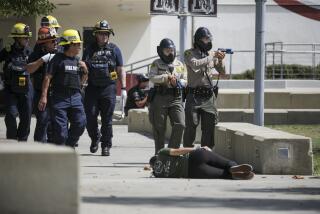Gun-Seizure Law Targets the Unstable
HARTFORD, Conn. — Before Columbine, before the Atlanta day trader offices, before the Jewish community center in Los Angeles, there was Matthew Beck.
In March 1998, the 35-year-old accountant went on a suicidal shooting spree in his offices at the Connecticut Lottery headquarters. Four people died before Beck put the gun to his own head.
Lawmakers reacted with one of the toughest gun-seizure laws on the books.
Starting this month, Connecticut police will be allowed to confiscate guns from anyone determined to be an immediate danger to himself or others. The law is rooted in the notion that rampages like Beck’s are preceded by a detectable descent into madness.
Critics fear the law could lead to unwarranted searches and seizures.
Supporters say the standards for seizing guns are so high that the law will seldom be used.
From both sides, Connecticut’s law--apparently the first of its kind--is attracting attention.
Seizing a gun will require more than suspicion, said state police Lt. Robert Kiehm. There must be evidence that the person recently tortured animals, threatened to kill himself or others or acted violently. A police investigation must conclude that there is no other way to keep the person from doing harm, and a warrant must be issued by a judge. The law also requires a hearing within 14 days to determine whether the gun should be returned.
“You need probable cause just to begin an investigation,” Kiehm said. “But it gives police officers the power to take some proactive steps instead of waiting for something to happen.”
Beck had threatened to kill his bosses at the lottery several days before the rampage. His co-workers were so nervous that one started bringing a gun to work for his own protection, said state Rep. Michael Lawlor, the law’s sponsor. Under the new law, if those co-workers had “called the cops and said Beck was talking about guns and making threats, something could have been done,” Lawlor said.
Gun-rights advocates argue that allowing police to take weapons from people who haven’t done anything wrong violates their constitutional right to bear arms.
“You don’t forfeit your rights just because you might do something bad,” said Dennis Fusaro, director of state legislation for Gun Owners of America. The National Rifle Assn. declined to comment.
The law also could lead to illegal searches, said state Rep. Richard Tulisano. “Now police can say, ‘We saw you kick a dog peeing on your petunias, so now we could go in your house and look for guns because you might be dangerous,’ ” Tulisano said. “What happens if . . . they find drugs? This law becomes the basis for which people could invade your home.”
Lawmakers in other states say the focus on prevention is the law’s strength.
Illinois Rep. Tom Dart, a Chicago Democrat, said he plans to introduce a similar Illinois proposal in November. “The thing that frustrates me is that when they’re pulling bodies out of a house, neighbors are telling the police, ‘Yeah, the guy who shot them was nuts--we all knew that,’ ” Dart said.
Steven Duke, a Yale law professor, said he doubts the law would have prevented Mark O. Barton from killing nine people at two brokerage firms in Atlanta in July.
But Lawlor said the new law could stop people like Benjamin Nathaniel Smith, the white supremacist who killed two people and wounded nine during a two-state shooting spree targeting Jews, blacks and Asians.
Smith’s criminal record and reputation for passing out hate literature could have prompted police to take action, Lawlor said.
“The value of this law is not so much that police will seize your guns,” Lawlor said. “It gives police a system to investigate a person who poses a threat.”
More to Read
Sign up for Essential California
The most important California stories and recommendations in your inbox every morning.
You may occasionally receive promotional content from the Los Angeles Times.










